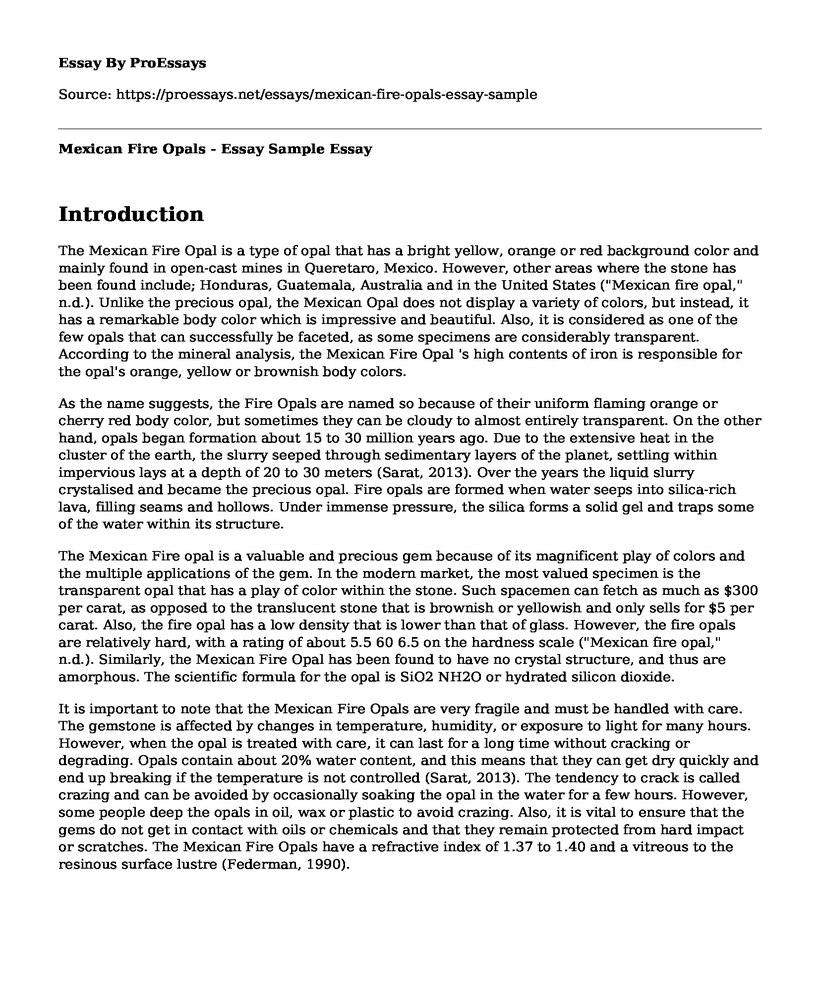Introduction
The Mexican Fire Opal is a type of opal that has a bright yellow, orange or red background color and mainly found in open-cast mines in Queretaro, Mexico. However, other areas where the stone has been found include; Honduras, Guatemala, Australia and in the United States ("Mexican fire opal," n.d.). Unlike the precious opal, the Mexican Opal does not display a variety of colors, but instead, it has a remarkable body color which is impressive and beautiful. Also, it is considered as one of the few opals that can successfully be faceted, as some specimens are considerably transparent. According to the mineral analysis, the Mexican Fire Opal 's high contents of iron is responsible for the opal's orange, yellow or brownish body colors.
As the name suggests, the Fire Opals are named so because of their uniform flaming orange or cherry red body color, but sometimes they can be cloudy to almost entirely transparent. On the other hand, opals began formation about 15 to 30 million years ago. Due to the extensive heat in the cluster of the earth, the slurry seeped through sedimentary layers of the planet, settling within impervious lays at a depth of 20 to 30 meters (Sarat, 2013). Over the years the liquid slurry crystalised and became the precious opal. Fire opals are formed when water seeps into silica-rich lava, filling seams and hollows. Under immense pressure, the silica forms a solid gel and traps some of the water within its structure.
The Mexican Fire opal is a valuable and precious gem because of its magnificent play of colors and the multiple applications of the gem. In the modern market, the most valued specimen is the transparent opal that has a play of color within the stone. Such spacemen can fetch as much as $300 per carat, as opposed to the translucent stone that is brownish or yellowish and only sells for $5 per carat. Also, the fire opal has a low density that is lower than that of glass. However, the fire opals are relatively hard, with a rating of about 5.5 60 6.5 on the hardness scale ("Mexican fire opal," n.d.). Similarly, the Mexican Fire Opal has been found to have no crystal structure, and thus are amorphous. The scientific formula for the opal is SiO2 NH2O or hydrated silicon dioxide.
It is important to note that the Mexican Fire Opals are very fragile and must be handled with care. The gemstone is affected by changes in temperature, humidity, or exposure to light for many hours. However, when the opal is treated with care, it can last for a long time without cracking or degrading. Opals contain about 20% water content, and this means that they can get dry quickly and end up breaking if the temperature is not controlled (Sarat, 2013). The tendency to crack is called crazing and can be avoided by occasionally soaking the opal in the water for a few hours. However, some people deep the opals in oil, wax or plastic to avoid crazing. Also, it is vital to ensure that the gems do not get in contact with oils or chemicals and that they remain protected from hard impact or scratches. The Mexican Fire Opals have a refractive index of 1.37 to 1.40 and a vitreous to the resinous surface lustre (Federman, 1990).
Conclusion
In conclusion, the Mexican Fire Opal is a precious and a beautiful gem which takes millions of years to form. Also, the Opal is not only used for decoration, but also has religious purposes where it is attributed good luck to the wearer, and is said to have healing powers in the lower back, kidney, and can stimulate sexual organs (Federman, 1990). The stone is also said to boost the self-esteem to people who are shy and lack self-confidence. In other areas, people believe that placing a fire opal in the place of business is an excellent way to attract customers.
References
Federman, D. (1990). Mexican Fire Opal. Modern Jeweler's Consumer Guide to Colored Gemstones, 134-137. doi:10.1007/978-1-4684-6488-7_32
Mexican fire opal. (n.d.). Dictionary of Gems and Gemology, 567-567. doi:10.1007/978-3-540-72816-0_14297
Sarat, L. (2013). Fire from Heaven. Fire in the Canyon, 29-53. doi:10.18574/nyu/9780814759370.003.0001
Cite this page
Mexican Fire Opals - Essay Sample. (2022, Nov 30). Retrieved from https://proessays.net/essays/mexican-fire-opals-essay-sample
If you are the original author of this essay and no longer wish to have it published on the ProEssays website, please click below to request its removal:
- Expansion Beginning 1500 of Asian Empires
- Some Questions on Physics
- Harrison H. Schmitt and William Happer: In Defense of Carbon Dioxide
- Paper Sample on Physics: Newton's Law of Cooling
- Fundamentals of Drying Processes Paper Example
- Euler and the Function Concept and Philosophy of Mathematics Essay
- Essay Sample on Origins of Earth's Oceans: 6 Billion Yrs Ago







